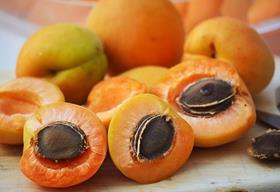
Leading figures in the Italian fresh produce business have described as “embarrassing” the revelation that Spanish apricots may have been among fruit and vegetables handed out free of charge to schoolchildren last month by Italy’s national scheme Frutta nelle Scuole, which is funded in part by the European Union.
The idea that Spanish stonefruit could have been handed out to schoolchildren in Emilia Romagna, a region renowned for its own abundant stonefruit production at this time of year, has caused great consternation, and follows recent reports of poor-quality produce being distributed as part of the scheme – involving apricots and carrots– at schools in Bologna, as well as a separate report of mouldy apricots being stopped on their way to schools in Arienzo, near Naples.
Davide Vernocchi, president of Italian cooperative Apo Conerpo, commented: “The fact that apricots from Spain are being distributed in several of Emilia Romagna’s schools as part of the ministerial food education programme Fruit in Schools is embarrassing and disconcerting.”
Although European Commission rules governing the EU-wide scheme do not oblige companies to supply product grown in their own country, Vernocchi argued that the case raised a major concern about the transparency of sourcing arrangements when it came to supplying free fresh produce to schools.
“Even if we are not talking about a violation of the rules, we think this is a serious anomaly,” he said. “Our concern is that it’s the result of mere speculation, which ignores the availability of abundant volumes of Italian product in the market in recent weeks, even in the cities involved in these cases.”
Vernocchi, who was speaking on behalf of the Italian fresh produce industry in his role as sector coordinator for the national Agribusiness Cooperatives Alliance, said the quality of Spanish product involved was in many cases poor, cultivating a lack of trust among producers in the institutions charged with administering the scheme.
“People always pay lip service to environmental and territorial sustainability, but in reality there is often no consistency with what is being said,” he continued. “We are therefore appealing to all of the fresh produce companies involved in the ministerial programme in various capacities because they take the lead when it comes to marketing Italian product and there should be no further cases of Spanish fruit being preferred to Italian.”
Simona Caselli, regional agriculture minister for Emilia Romagna described the suspected cases of low-grade product ending up in certain schools as 'completely unacceptable.”
“If the news is confirmed that damaged fruit and vegetables intended for children has been found in Bologna schools,' she said, 'then we are facing a very serious episode.”
Annual contracts up for grabs
Fresh fruit and vegetables distributed by the schools scheme in Emilia Romagna– as well as in Marche, Friuli-Venezia Giulia and Sardinia– are supplied by Mantua-based Cooperativa Ortofrutticola Mantovana (Corma), under an annual contract reported to be worth around €1.4m.
Eight other Italian companies currently hold similar contracts to supply schools in other parts of the country: Alegra (Bolzano, Trento and Veneto), Apofruit (Lazio), Arca Fruit (Basilicata and Puglia), CDP (Campania and Molise), Cof (Lombardy), Leonardos (Abruzzo, Tuscany and Umbria), Melavi’ (Aosta Valley, Liguria and Piedmont) and Natura (Calabria and Sicily).
All of those contracts to supply fresh fruit and vegetables as part of the nationwide Frutta nelle Scuole project have now been put out to tender, with the application process for 2018/19 due to close on 31 July.
Writing in regional newspaper Il Resto del Carlino, journalist Federica Gieri Samoggia explained that the company was required to deliver produce – including apples, pears, oranges, kiwifruit and either carrot sticks or apple slices – twice during every second week between November and June.
At the time of writing, no-one from Corma was available to speak to Fruitnet, but the company’s Antonio Leone was quoted in the newspaper as saying that an investigation was underway to discover what had gone wrong.
“We are very sorry for the incident,” he said, adding that some quality control checks might have been missed. In the case of the carrots, he noted, it may be that they were left out of the refrigerator on arrival in the morning and were served in the afternoon, rather than by 10:30am as is supposed to happen.



